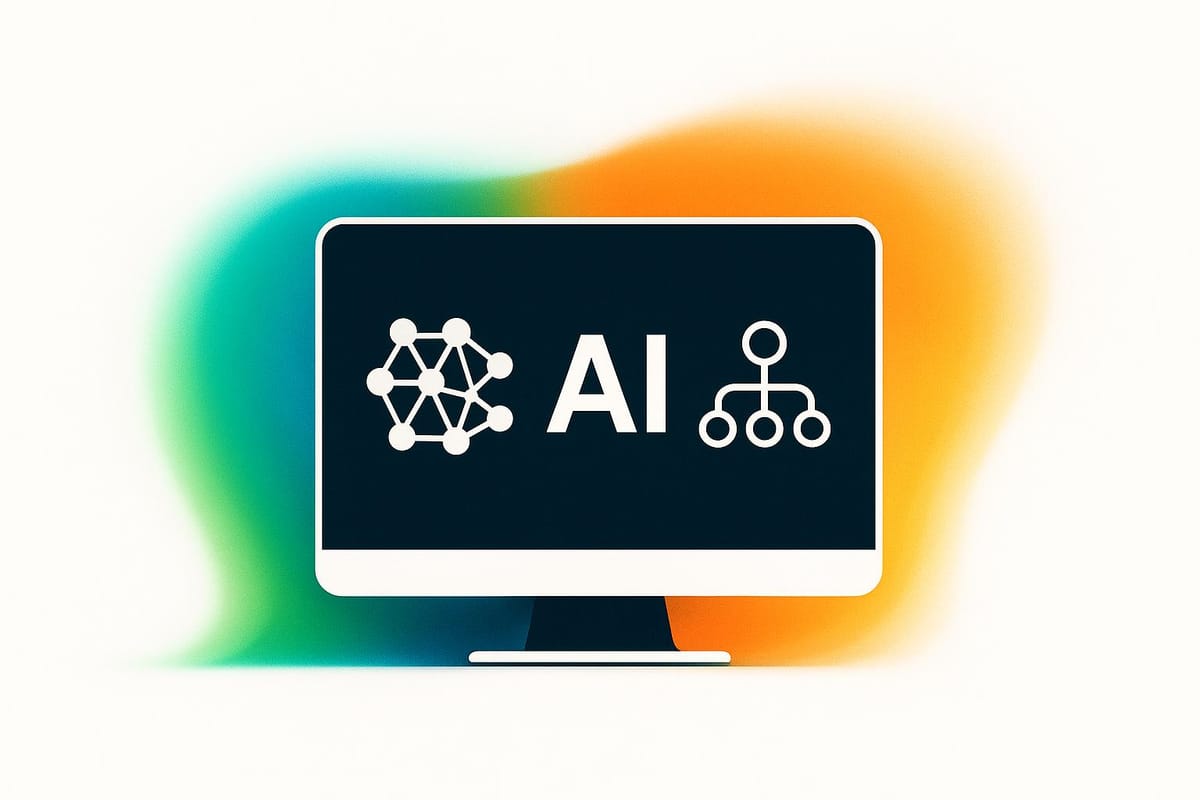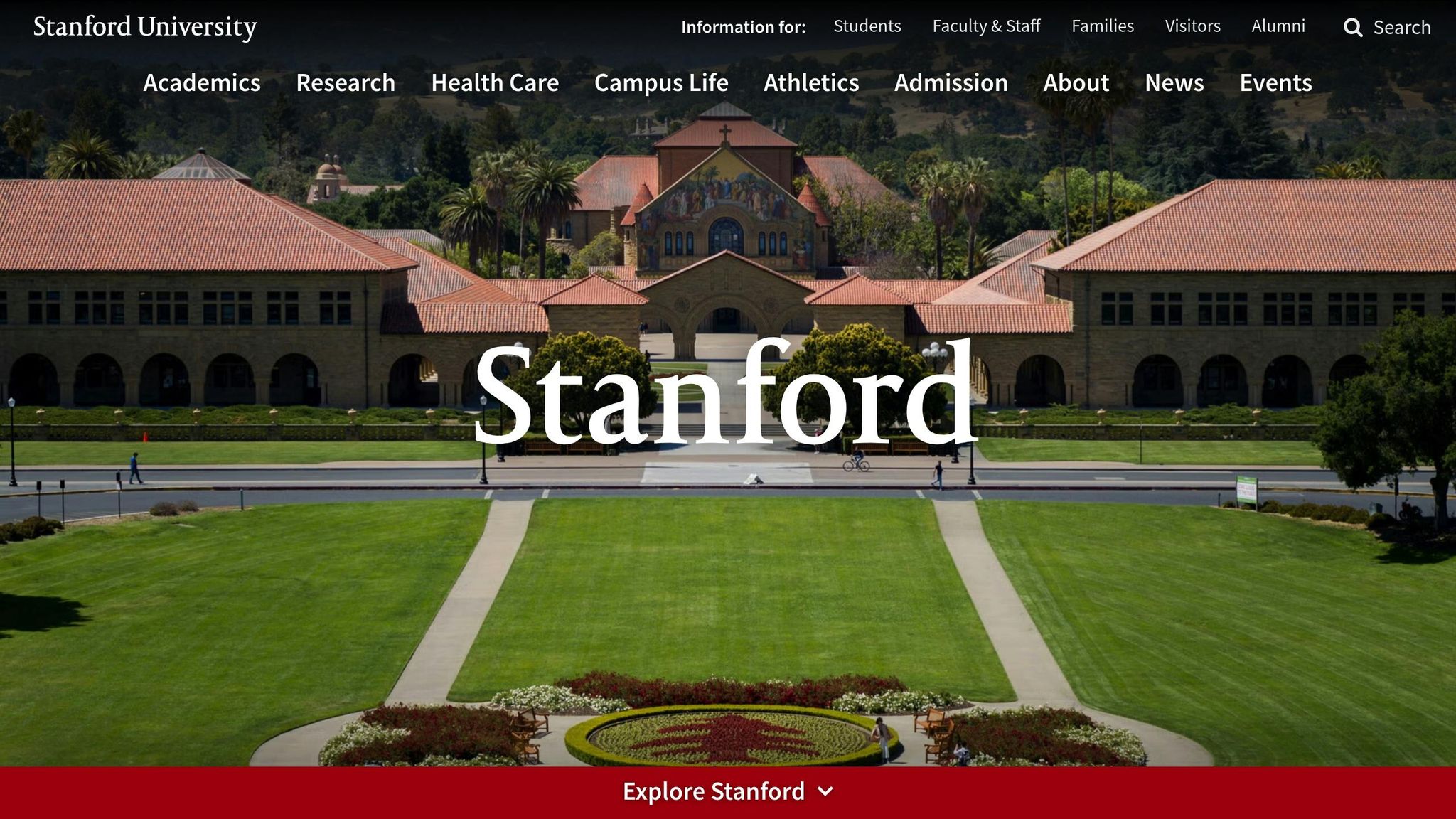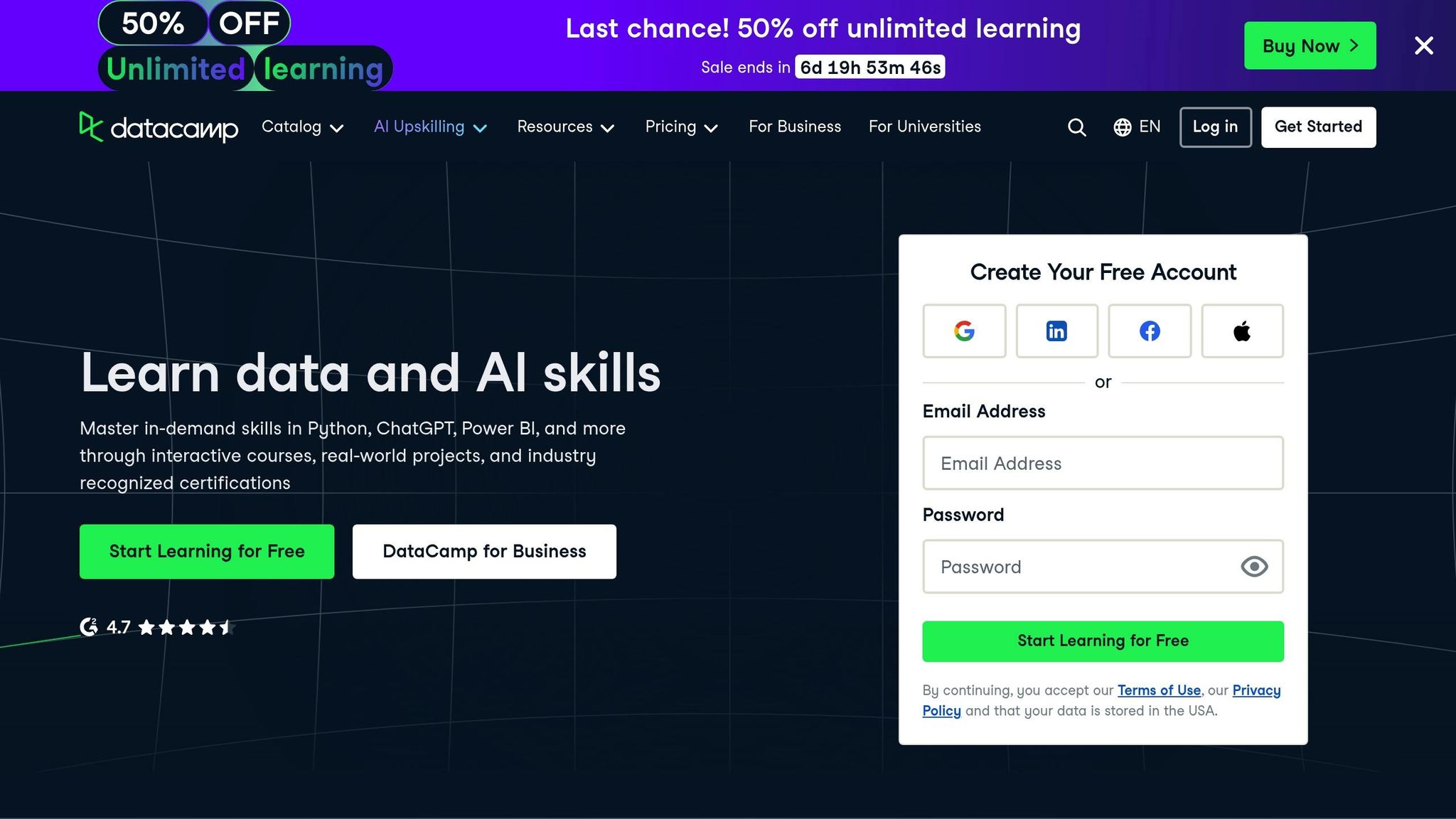Best Online AI Courses and Certifications in 2025
Explore the top online AI courses and certifications in 2025 to boost your career in artificial intelligence, catering to various skill levels and budgets.

Artificial intelligence skills are in high demand across industries in 2025, with employers seeking professionals equipped with both theoretical knowledge and practical experience. Whether you're a beginner, transitioning to AI, or looking to advance your career, earning a recognized certification can boost your prospects. Here's a quick overview of five leading AI programs in the U.S.:
- Upskillist: Offers CPD-approved AI courses with flexible learning and lifetime access. Ideal for professionals balancing work and studies.
- Stanford AI Graduate Certificate: Prestigious university-backed program for advanced learners. Focuses on deep technical expertise but requires significant time and financial investment.
- IBM AI Engineering Professional Certificate: Practical, project-based learning for aspiring AI engineers, available on a flexible subscription model.
- Google AI Certificates: Beginner to advanced programs, emphasizing hands-on skills for deploying machine learning systems.
- DataCamp AI Fundamentals: Beginner-friendly program focusing on Python, machine learning, and coding exercises, perfect for those new to AI.
Each program caters to different skill levels, budgets, and career goals. Below is a quick comparison to help you decide.
Quick Comparison
| Program | Accreditation | Learning Focus | Hands-On Projects | Cost Range | Best For |
|---|---|---|---|---|---|
| Upskillist | CPD-approved | Beginner to Intermediate | Yes | Subscription-based | Flexible learning for busy learners |
| Stanford AI Certificate | University-accredited | Advanced AI Concepts | Moderate | $20,725–$25,450 | Advanced technical careers |
| IBM AI Engineering | Corporate-certified | Practical AI Engineering | High | $49/month | Aspiring AI engineers |
| Google AI Certificates | Google-certified | Cloud-based AI Skills | High | Varies by program | Cloud and ML professionals |
| DataCamp AI Fundamentals | Industry-recognized | Beginner AI Skills | Very High | Subscription-based | Newcomers to AI and data science |
Choose based on your career goals, budget, and the depth of learning you need. Whether you're just starting or aiming to specialize, there's a program here for you.
9 Best AI Certifications For 2025
1. Upskillist: Accredited AI Courses with Personalized Learning

Upskillist is an online platform that provides accredited AI courses tailored to meet the needs of both beginners and seasoned professionals. Whether you're just stepping into the world of artificial intelligence or looking to deepen your expertise, Upskillist offers a structured learning experience designed to help you achieve your goals.
"Our online courses are designed for both beginners and experienced professionals eager to master AI. Through a comprehensive curriculum, it caters to both novices and seasoned professionals. The courses not only prepare learners to interact with AI but also to innovate and lead in the landscape of artificial intelligence communication. Leveraging the cutting-edge capabilities of AI platforms like ChatGPT and Heygen."
With recognized accreditation and glowing feedback from students, Upskillist has established itself as a trusted source for AI education.
Accreditation and Recognition
Upskillist's AI courses are CPD (Continuing Professional Development) approved, meaning they meet rigorous industry standards. Upon completing a course, students receive diplomas featuring the official CPD approval logo. This accreditation ensures that learners not only gain valuable knowledge but also earn credentials that stand out in competitive job markets. Reviews for the Artificial Intelligence Course are consistently high, averaging between 4.5 and 4.9 out of 5 stars.
Curriculum and Skill Development
The courses are carefully crafted by in-house experts who focus on delivering lessons that are both engaging and practical. The curriculum emphasizes actionable skills that learners can immediately use in their careers, personal projects, or even hobbies.
Hands-On Learning and Projects
Upskillist’s courses include 20 hours of hands-on training, complete with practical exercises and free assessments. This approach ensures students not only understand the theory but also gain real-world experience they can apply right away.
Cost and Accessibility
To make learning accessible, Upskillist offers a 7-day free trial, giving students full access to explore the content before committing. After the trial, learners can opt for affordable monthly plans, which include lifetime access to course materials. This flexibility allows students to revisit lessons as AI technology evolves, ensuring their knowledge stays up-to-date.
2. Stanford University AI Graduate Certificate

Stanford University's AI Graduate Certificate is a highly regarded credential in the field of artificial intelligence. This program combines the expertise of Stanford's renowned faculty with its advanced research, offering graduate-level training that's well-respected throughout the tech industry.
Accreditation and Recognition
This certificate carries the prestige of Stanford University, one of the top academic institutions in the United States. It's tailored for professionals aiming to enhance their AI knowledge without committing to a full master's degree. Thanks to Stanford's reputation and its close ties to Silicon Valley, this qualification is particularly valued by employers in the tech sector. The program's rigorous curriculum ensures participants gain a deep understanding of advanced AI concepts.
Curriculum and Skill Level
To earn the certificate, students must complete four graduate courses totaling 13-16 units. The coursework strikes a balance between theoretical principles and hands-on applications, making it ideal for those with a technical background who want to deepen their expertise in AI. Expect to dedicate 15-20 hours per week to lectures and assignments for each course. This demanding schedule reflects the program's academic intensity and ensures comprehensive training in advanced topics.
Cost and Duration
The cost of Stanford's AI Graduate Certificate is $1,575 per credit unit, bringing the total tuition to $20,475-$25,200, depending on the courses selected. Additionally, there is a one-time document fee of $250 during the first course registration.
| Cost Component | Amount | Notes |
|---|---|---|
| Tuition per credit unit | $1,575 | Applies to all 13-16 required units |
| Total tuition range | $20,475 - $25,200 | Based on 13-16 units required |
| One-time document fee | $250 | Charged during first course registration |
| Total program cost | $20,725 - $25,450 | Includes tuition and all fees |
Most students complete the program within 1-2 years, though Stanford allows up to three academic years to finish. This flexibility is particularly beneficial for working professionals balancing their studies with job responsibilities.
3. IBM AI Engineering Professional Certificate

The IBM AI Engineering Professional Certificate is designed for professionals eager to develop practical AI engineering skills, offering a flexible, subscription-based approach to learning.
Program Overview
The program consists of six courses that blend theoretical knowledge with hands-on projects. This structure allows learners to not only understand AI concepts but also apply them by building and deploying AI solutions. It’s a practical way to gain experience that mirrors real-world scenarios.
Cost and Duration
Access to the program is available through a subscription model priced at $49 per month. Since the subscription can be canceled at any time, the total cost depends on how quickly you complete the courses. For a limited time, the first month is offered free of charge.
On average, students finish the program in 4–5 months, dedicating about 10 hours per week. However, completion times can range from 3 to 7 months, depending on individual schedules and learning speeds.
4. Google AI Essentials and Career Certificates
Google provides a range of AI programs tailored to suit both beginners and those with more experience. These offerings include an introductory course for newcomers and advanced certificates aimed at building technical expertise.
Curriculum and Skill Level
The introductory course is perfect for those just starting out. It covers the basics of machine learning, neural networks, and key AI principles, while also exploring how these ideas can be applied in professional and business settings. For learners with a bit of technical know-how, the advanced certificate programs dive deeper, focusing on the skills needed to address complex, real-world AI challenges.
Practical Learning and Projects
One of the standout features of Google’s programs is their focus on hands-on learning. Through practical exercises and project-based assignments, students get to apply what they learn in real scenarios. This not only strengthens their understanding but also helps them build a portfolio to showcase their skills to potential employers. The combination of practical experience and flexible pricing ensures that advanced learning is within reach for many.
Cost and Duration
Google’s AI courses operate on a subscription basis. Most students can complete the foundational program in a few months, while the advanced certificate tracks take longer due to their more detailed and comprehensive content.
Accreditation and Recognition
Google’s AI certificates are highly regarded in the tech industry. The practical training and technical expertise gained through these programs are valued by employers, and students may even earn academic credit through Google’s partner institutions.
5. DataCamp AI Fundamentals Certification

DataCamp offers a beginner-to-intermediate program designed to help you grasp the essentials of artificial intelligence. This certification provides a solid starting point, preparing learners to dive into more advanced AI topics down the line.
Curriculum and Skill Level
The course covers key topics like machine learning algorithms, data preprocessing, statistical analysis, supervised and unsupervised learning, and introductory neural network concepts. It emphasizes Python programming and popular libraries like pandas, scikit-learn, and TensorFlow, with lessons structured to build knowledge step by step.
Practical Learning and Projects
What sets DataCamp apart is its focus on hands-on learning. You'll work through coding exercises and real-world projects, applying what you've learned immediately. This approach helps you build a portfolio of practical AI applications, showcasing your skills in action.
Cost and Duration
For details on pricing, subscription options, and how long the program takes, check out DataCamp's official website.
Accreditation and Recognition
Although not tied to academic institutions, DataCamp certificates demonstrate practical expertise in data science and AI. They can be added to your LinkedIn profile or resume to highlight your growing skill set in these fields.
Comparison: Pros and Cons
Let’s break down the strengths and limitations of these AI courses to help you decide which one fits your goals, budget, and schedule. Each program offers unique benefits and trade-offs, so the right choice depends on how you want to shape your learning journey and career path.
Upskillist takes a personalized approach to learning, using AI tools like Compass AI and Pathfinder to tailor the experience. With flexible scheduling, a 7-day free trial, and lifetime access through a subscription model, it’s a great option for professionals juggling a busy schedule.
Stanford University's AI Graduate Certificate brings both prestige and rigor. This program is ideal for those aiming for advanced technical roles, research opportunities, or leadership positions in AI-driven fields. However, the demanding curriculum requires a significant time investment, making it better suited for those ready to commit fully to their studies.
IBM's AI Engineering Professional Certificate focuses on practical, industry-relevant skills. It’s designed for students aiming to build a portfolio and gain hands-on experience through projects. With IBM digital badges and Coursera certification, this program is a solid stepping stone into AI engineering roles.
Google's AI programs offer well-recognized credentials. The Professional Machine Learning Engineer certification validates expertise in deploying production ML systems and managing MLOps, while Google AI Essentials serves as an accessible starting point for beginners looking to explore AI.
DataCamp's AI Fundamentals Certification is tailored for newcomers to AI and data science. Its beginner-friendly content, interactive coding exercises, and real-world projects provide a step-by-step introduction to the field, making it a great choice for those transitioning into tech.
The table below summarizes the key features of each program:
| Program | Accreditation | Curriculum Depth | Hands-on Learning | Time Commitment | Best For |
|---|---|---|---|---|---|
| Upskillist | Industry-recognized | Comprehensive | High (AI-powered personalization) | Flexible | Busy professionals seeking tailored learning |
| Stanford AI Certificate | University accredited | Very High | Moderate | High (6-12 months) | Advanced technical roles or research positions |
| IBM AI Engineering | Corporate certification | High | High (portfolio projects) | Moderate (4-6 months) | Aspiring AI engineers |
| Google AI Programs | Google Cloud certified | Moderate to High | High (cloud-focused) | Variable | Cloud ML engineers in the Google ecosystem |
| DataCamp AI Fundamentals | Industry-recognized | Moderate | Very High (interactive coding) | Low (2-3 months) | Beginners or those entering data science |
When it comes to cost, university-backed programs tend to be more expensive, reflecting their academic prestige. Corporate certifications, on the other hand, often offer a more affordable route with strong career value. Subscription-based platforms provide flexibility, allowing you to explore multiple subjects without a hefty upfront investment.
Your skill level is key in choosing the right program. Beginners will benefit from structured, guided courses, while experienced professionals might prefer specialized tracks tailored to their specific interests. If your goal is to master certain technologies, choose a program that aligns with the tools and career path you’re aiming for.
Conclusion
The best program for you ultimately hinges on your career stage, learning preferences, and specific goals.
If you're transitioning into the field, DataCamp's AI Fundamentals Certification offers an accessible starting point, complete with interactive coding exercises and a structured learning path. For those who value flexibility, Upskillist provides personalized AI-driven tools and a 7-day free trial, making it a great fit for adapting to a busy schedule.
For professionals aiming to deepen their technical expertise, Stanford's AI Graduate Certificate is a strong choice, though its academic rigor demands full commitment. Meanwhile, hands-on learners looking to build a portfolio may find IBM's AI Engineering Professional Certificate particularly appealing, thanks to its focus on practical projects and industry-ready skills.
If you're already working in cloud environments, especially within the Google ecosystem, Google's AI programs offer certifications tailored to deploying machine learning systems in production - a valuable asset for cloud-focused roles.
Budget is another key factor. University programs bring prestige but come with higher costs, while platforms like Upskillist and corporate certifications provide more affordable and flexible options.
With AI advancing rapidly, it's crucial to pick a program that not only equips you with current skills but also promotes continuous learning. Choose the path that aligns with your immediate needs and sets you up for long-term success in the evolving AI landscape.
FAQs
How do I decide between an academic AI program like Stanford's Graduate Certificate and a corporate certification like IBM's AI Engineering Professional Certificate?
Choosing between an academic program like Stanford's Graduate Certificate and a corporate certification such as IBM's AI Engineering Professional Certificate really boils down to your personal goals, experience, and resources. Academic programs often provide a strong theoretical foundation, making them a great choice if you're pursuing advanced research or planning to work toward a formal degree. On the flip side, corporate certifications are centered on practical skills and hands-on applications, which can be perfect for professionals aiming to quickly gain expertise for specific job roles.
When deciding, think about your current technical background, the time investment you're willing to make, and the cost of each option. If your goal is to gain industry-recognized credentials that can give your career a quick boost, a corporate certification might be the way to go. But if you're looking to establish a long-term academic or research-focused trajectory, an academic program could be a better match.
How do platforms like Upskillist ensure their AI courses stay current with the latest advancements?
Platforms like Upskillist ensure their AI courses remain current by continuously revising and updating their content. They focus on incorporating the latest trends and advancements in artificial intelligence, which might include refreshing existing lessons, introducing new modules, and integrating emerging technologies. This approach helps learners stay informed and acquire knowledge that’s relevant to today’s rapidly changing landscape.
These platforms also work closely with industry professionals to develop courses that align with the latest professional standards. This collaboration ensures learners are equipped with skills that meet the demands of the ever-evolving AI industry, keeping them competitive in this dynamic field.
Which AI certification is best for my career goals, and how can I choose the right program?
Choosing the right AI certification starts with understanding your career goals and the specific roles you're targeting. Are you aiming to become an AI Engineer, Machine Learning Specialist, Data Scientist, or perhaps an AI Product Manager or Business Consultant? Once you’ve identified your ideal position, take stock of your current skills. Some certifications cater to beginners, while others demand a strong background in programming or mathematics.
Next, evaluate how well the certification is recognized in your field. For example, credentials from major cloud providers like AWS or Azure are often valued in enterprise environments. On the other hand, certifications from institutions like Stanford or IBM might be more relevant for academic or highly technical roles. Lastly, determine whether you’re looking to specialize in AI or simply want to build on your existing skills to advance in your current job. Aligning your certification choice with your career aspirations ensures you’re investing in the right path for your future.

